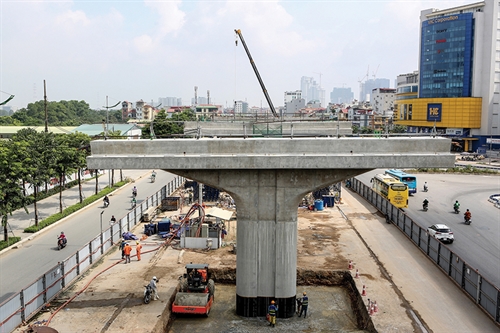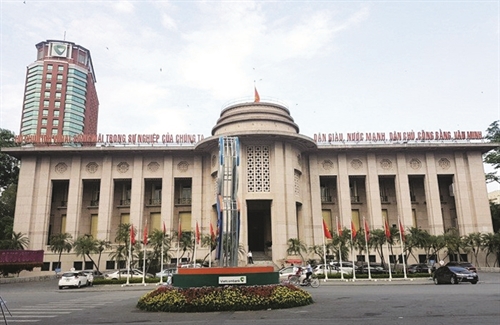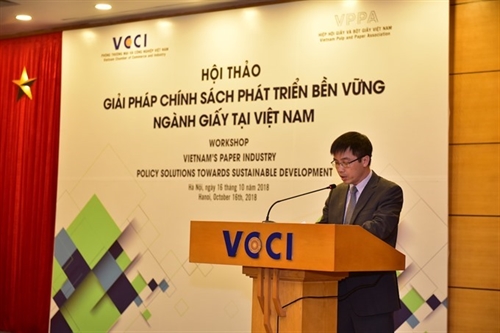From October 1, state-funded projects will be subject to the new rule on management of construction investment costs, reads a decree recently issued by the Government.
According to the drafter - the Ministry of Construction, Decree 68, which replaces Decree 32 of 2015, is designed to better manage construction investment costs of public projects in an attempt to improve market economy institutions and meet international integration requirements.
It is also expected to raise the investment efficiency and create a more transparent and competitive construction market for the business cycle and entities engaged in construction investment activities.
 |
The 2.682km Mai Dich-Co Nhue section - part of the Mai Dich-Nam Thang Long overpass construction project - is under construction__Photo: Thanh Dat/VNA |
| The 2.682km Mai Dich-Co Nhue section - part of the Mai Dich-Nam Thang Long overpass construction project - is under construction__Photo: Thanh Dat/VNA |
Clearer policy framework
In addition to projects financed with state budget and off-budget state funds prescribed in Decree 32, the new Decree’s scope of regulation also covers projects in the form of public-private partnership (PPP projects). This is aimed to comply with Decree 59 of 2015, which prescribes that PPP projects are subject to management requirements like those using state funds.
With this move, the new regulation is expected to satisfy the objectives of management of public investment projects, and tackle current shortcomings detected through audit of PPP projects, especially BOT transport project, and form a clearer policy framework on management of construction investment costs.
Regarding cost management of specialized construction works, Decree 68 adds two management principles.
First, for specialized construction works classified as state secrets and works constructed under the State’s urgent orders, it is required to apply the method of determining construction investment costs through construction norms, unit prices and indexes as bases for calculating their value in public property. The appraisal and approval of construction management costs of these works must comply with relevant provisions on management of construction of specialized construction works.
Second, for infrastructure construction facilities under the two national target programs on sustainable poverty reduction and building of the new countryside, the principles and methods for determination of construction investment costs prescribed in the Decree will be applied as suitable to their characteristics.
One of the drawbacks of Decree 32 is methods for determination of total investment amounts. Though there are four methods provided under the Decree, public projects’ total investment amounts have still been inaccurately calculated, which results in multiple adjustments to the investment amounts during the project implementation, or leads to the loss of state budget funds.
To tackle the situation, Decree 68, while retaining those four methods, provides some amendments concerning principles and methods for the determination of and structure of cost items in the total investment amounts, and construction cost estimates. This aims to ensure the accuracy of the planned total investment amounts, especially for large-scale projects and projects with their bidding packages’ prices calculated based on the approved total investment for implementation under engineering-procurement-construction or engineering-construction contracts.
Accordingly, the total investment amount of a project will be determined based on: the construction volume calculated according to the base design and other necessary requirements of a project; the investment rate for work construction; data on the costs of completed or ongoing similar works; or the combination of the above ones.
In addition, to better manage construction investment costs, Decree 68 requires a project’s total investment amount to be adjusted and approved right after the actual cost is detected to exceed the planned amount.
Currently, the total investment amount is often adjusted when a project is already completed, which shows that cost adjustment and approval procedures are merely to make the project’s investment amount proper, but not to serve cost management purposes.
The Decree also requires re-appraisal of adjusted total investment amounts. However, it fails to clarify whether the whole investment amount or only the increased or decreased amount is to be re-appraised.
Unlike Decree 32, the new rule gives more powers to investment deciders, instead of project owners.
While Decree 32 allowed project owners to adjust the structure of cost items in the total investment as long as such adjustment does not result in an increase in the approved total investment amount, Decree 68 requests investment deciders to approve adjustments to the total investment amounts and be responsible for the approval.
Investment deciders will also be competent to decide on the use of provisions of the construction cost estimates. This is aimed to prevent project owners from abusing their powers to use provisions for improper purposes as seen in almost all projects in the recent years.
Decree 68 also makes some changes on issuance of construction norms, prices and indexes applicable to state budget-funded projects and PPP projects to deal with the current unmethodical or improper application of construction norms, prices and indexes for the purpose of increasing total investment amounts, which causes loss and waste of state budget funds.
It has provisions aiming to improve the management of use of price quotations, and building and management of a national database on construction norms and prices to prevent persons in charge of making cost estimates from arbitrarily using quotations. Such database is expected to ensure transparent, effective and objective management of construction investment costs, as well as assist in making market forecasts and formulating sectoral development strategies.
Furthermore, the Decree clarifies responsibilities of entities engaged in management of construction investment costs and sanctions to be imposed on such entities for their improper management of construction costs, causing delayed implementation of projects or loss and waste of construction costs.
Controversial issues
In the aspect of state management work, Decree 68 adds more responsibilities of the Ministry of Construction to guide and manage unit prices of construction materials and construction price indexes by geographical area as well as responsibilities of line ministries and local authorities.
However, according to the Vietnam Association of Construction Contractors (VACE), the Decree shows that state management agencies are involved in too many stages of the management process of construction costs, from preliminary appraisal of total investment amounts, approval of total investment amounts, construction cost estimates, and construction bidding packages, to issuance and application of construction norms, prices and price indexes. This might prolong project implementation periods, slow down the handling of problems arising during project implementation and create the “ask-and-give” mechanism.
The Decree is also said to fail to remove difficulties and shortcomings in terms of mechanisms and policies facing entities engaged in construction investment activities and construction enterprises.
The VACE holds the view that the new regulation does not comply with international and regional practices under which the State will perform the responsibility to provide instructions and information to businesses, and regulate the economy on the basis of respect for market rules.-









